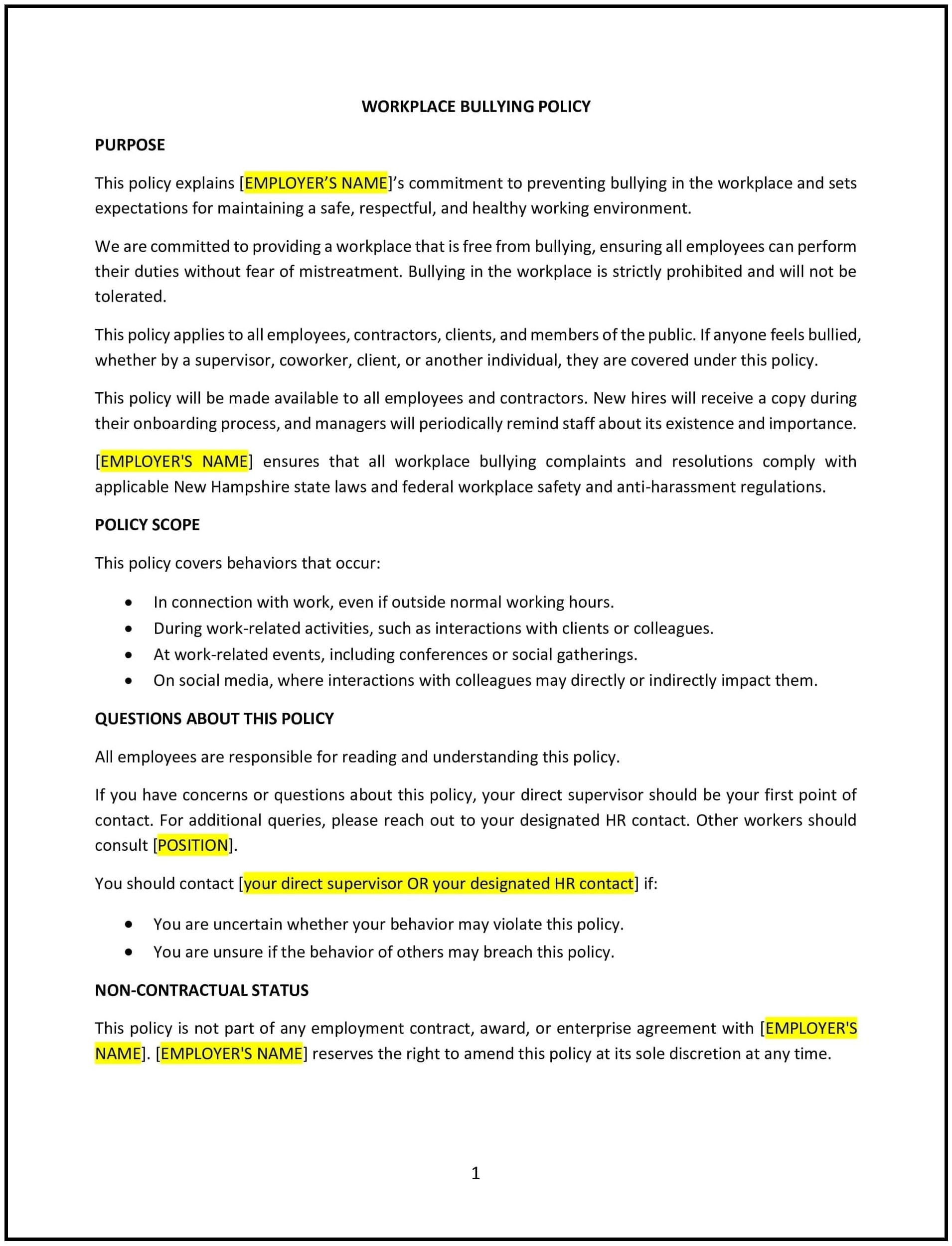Workplace bullying policy (New Hampshire): Free template
Got contracts to review? While you're here for policies, let Cobrief make contract review effortless—start your free review now.

Customize this template for free
Workplace bullying policy (New Hampshire)
A workplace bullying policy helps New Hampshire businesses establish clear guidelines for preventing and addressing bullying in the workplace. This policy defines workplace bullying, sets expectations for acceptable behavior, and outlines the steps employees should take if they experience or witness bullying.
By implementing this policy, businesses can foster a positive work environment, ensure respectful behavior among employees, and address any bullying incidents in a fair and consistent manner.
How to use this workplace bullying policy (New Hampshire)
- Define workplace bullying: Clearly define what constitutes workplace bullying, including physical intimidation, verbal abuse, harassment, or any behavior that creates a hostile or abusive environment.
- Set a zero-tolerance policy: State the company’s commitment to a zero-tolerance stance toward bullying and ensure that any form of bullying, whether physical, verbal, or psychological, is prohibited.
- Provide a reporting mechanism: Outline the process for employees to report instances of bullying, including the person or department to contact, whether reports can be made anonymously, and the timeframes for reporting.
- Specify investigation procedures: Detail the steps the company will take when a report of bullying is made, including how investigations will be conducted, confidentiality protocols, and timelines for resolution.
- Establish corrective actions: Describe the potential consequences for employees found guilty of bullying, including disciplinary actions, such as warnings, suspension, or termination, depending on the severity of the incident.
- Offer support for victims: Provide resources and support for employees who are victims of bullying, such as counseling, employee assistance programs (EAP), or referrals to outside support services.
- Set expectations for bystanders: Encourage employees who witness bullying to report it and assist in maintaining a respectful and safe work environment.
- Promote a respectful work culture: Establish a commitment to creating a culture of respect, inclusion, and open communication to prevent bullying behaviors from arising.
- Review and update: Regularly review the bullying policy to ensure it remains in line with state laws, company values, and best practices for handling workplace bullying.
Benefits of using this workplace bullying policy (New Hampshire)
This policy provides several benefits for New Hampshire businesses:
- Promotes a respectful work environment: A clear workplace bullying policy helps create an environment where all employees feel safe and respected, contributing to positive morale and engagement.
- Reduces risk of legal claims: By addressing bullying behaviors proactively and providing a clear process for resolution, businesses reduce the risk of discrimination or harassment claims.
- Improves employee productivity: When employees feel safe and respected, they are more likely to be productive and engaged in their work, contributing to better overall performance.
- Enhances employee retention: A workplace free from bullying fosters loyalty and reduces turnover, as employees are more likely to stay with an organization that values their well-being.
- Encourages accountability: A defined policy and set consequences help hold employees accountable for their behavior, ensuring that bullying is addressed quickly and appropriately.
Tips for using this workplace bullying policy (New Hampshire)
- Communicate the policy clearly: Ensure all employees are aware of the policy, how to report bullying, and the steps the company will take to address bullying incidents.
- Provide training: Offer training for employees and managers on how to recognize bullying behaviors, how to intervene, and the steps to take if they are involved in or witness bullying.
- Foster a culture of respect: Promote a work culture that emphasizes respect, inclusion, and open communication to prevent bullying from occurring.
- Encourage early reporting: Encourage employees to report any bullying concerns early so that the issue can be addressed before it escalates.
- Monitor the policy’s effectiveness: Regularly assess the policy’s impact and make adjustments as needed to ensure it continues to create a safe and respectful workplace.